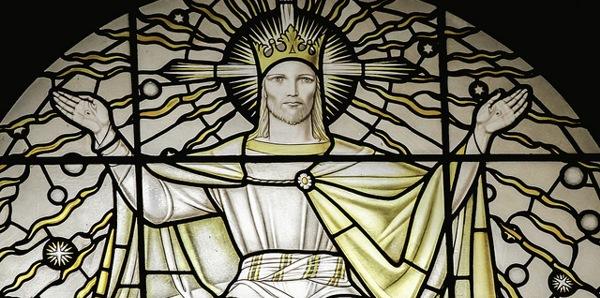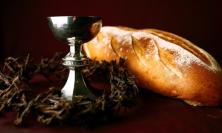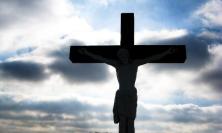The Church’s year concludes with a feast which looks towards the holiness and grace of the Kingdom of God. Roger Dawson SJ explains how the readings for the Feast of Christ the King in Year B juxtapose the rule of Christ with a more familiar – and, if we’re honest, often more appealing – expression of earthly power. ‘This feast is not to flatter a king with a fragile ego in need of reassurance, but to celebrate in gratitude the love and kindness of someone who is so committed to us that he will not baulk even at death itself.’
On the last Sunday of the liturgical year, we celebrate the Feast of Christ the King. It is a magnificent title, and in Year B the readings from Daniel and the Book of Revelation show us dreams and visions of a new and everlasting kingdom. But what about the Gospel? Well, the reading that the Church has given us is of a nightmare. We are plunged into the Passion. Jesus is alone; the crowds who sang ‘hosanna!’ as he entered Jerusalem just five days previously are now shouting, ‘Crucify him!’ He has been accused unjustly. His mission has all but collapsed. His friends have run away; one of them has sold him, another says that he does not even know him. And now he stands before the most powerful person in the land on a falsified charge. This is a really bad day, and it is about to get worse. He will be flogged, he will walk the way of the Cross ... what happens next is well known to us all. It is a day which seems, by our normal standards, to be characterised by failure and abandonment. This is not our usual idea of what happens to a king.
What we have here are two worlds, two kingdoms that come face to face as Jesus stands before Pilate. On the one side we have this earthly ruler representing the most successful empire the world had ever seen, a man with economic, political and military power; a successful man, with a reputation. This is someone to be taken seriously.
And in Jesus we have God’s world, the Kingdom of God personified, and a completely different set of values where we are not subjects or slaves, but we are now friends. We are not equals; God is the Creator, the maker and author of all, but our relationship with God has been restored. We have a king who rules over an eternal kingdom which, in the Preface of the Eucharistic Prayer for this feast, is described as:
a kingdom of truth and life,
a kingdom of holiness and grace,
a kingdom of justice, love and peace.
But which world do we value? Inevitably as Christians we inhabit both of these worlds, we move between them. We may spend six days a week living in one kingdom, but only one matters, and we know which one, but it is often hard to choose. Pilate represents one kingdom, Jesus represents the other.
In the Nicene Creed there are only two people (apart from Jesus) that are mentioned by name – Pilate and Mary – and again they show this same contrast: Pilate is wealthy, powerful, male, successful, secure, safely married; he has most of the things that many of us desire. Mary on the other hand, at the Annunciation, is a young woman, pregnant out of wedlock and therefore suspect, and at risk of exclusion from the Jewish community. She is one of the anawim, the voiceless, the poor who yearn for good news. Few of us desire to be like this.
We have these two worlds, two kingdoms. Only one of them is the Kingdom of God; only one of them is true, eternal and universal. But which do we choose? Which do we hope for? For which am I ambitious? If we are honest with ourselves, very often we would rather be Pilate.
But it is not about us, it is about Jesus. He is king, no one else. To talk of kingship or lordship can evoke images of oppressive or coercive systems, but for Jesus kingship is about humility and service. This feast is not to flatter a king with a fragile ego in need of reassurance, but to celebrate in gratitude the love and kindness of someone who is so committed to us that he will not compromise even in the face of the most powerful in the land, and who will not baulk even at death itself. The image of the Shepherd King may not be an especially rich one for most of us, but it was immensely powerful for the people of Israel, evoking ideas of care and love. All of this is in contrast to the kingship of power and domination, the reigns of kings that do not have the best interests of everyone at heart. This is the king who is lord over life and death and all there is.
There is plenty of ambition in this world; that is not necessarily a bad thing. But Christians are called to be ambitious for the Kingdom, not for ourselves; to seek power not in order to dominate, but to serve. The only throne that this king found was the cross. We are not to seek thrones of glory on which we can be admired, and if we do get them then we ought to pray for a very large dose of humility; we are to pray before the Throne of Glory from which we will receive mercy, love and hope.
In a world where we are so often encouraged to seek power and success, it can be difficult to accept the truth of this; however, this truth is not a proposition or an idea, but a person to get to know. ‘Everyone who belongs to the truth listens to my voice’, says Jesus – and Pilate does not hear him. One of the reasons the Church says that each Sunday is a Holy Day of Obligation is because in order to get to know this person, in order to be people of the truth we have to meet him – in the Word and sacrament – and spend time with him, listen to his voice: to find out about the Kingdom of God.
This is not easy, and we need the support of each other, the support of the Church. We, like Jesus, will probably encounter denial or betrayal. Like Judas and Peter, we may at times betray or deny him; these are risks for us also. But Christians are future-oriented people, and we are asked to have a vision of a better world, not just in the next life but in this, and to dream of a kingdom in which Christ is the king. We are people of hope –people who, in the future, can be free from our past and the worst we have done: our spectacular sins – the betrayals, the denials; and our mundane, ordinary and petty ones. But this hope is fragile and needs to be protected. In the Mass for the Feast of Christ the King we are asked to bring our worst to the Lord, to bring our nightmares and our horror. Our nightmare can be turned into dreams of hope; there is a future, death is not the end, Good Friday is followed by the resurrection. God will make all things new. The life, death and resurrection of Jesus show us this. Bring your best and your worst, your dreams and your nightmares to the altar. We have a king who can cope with that, a king who can cope with us. Thank God for that.
Roger Dawson SJ is Director of St Beuno’s Jesuit Spirituality Centre in North Wales.






